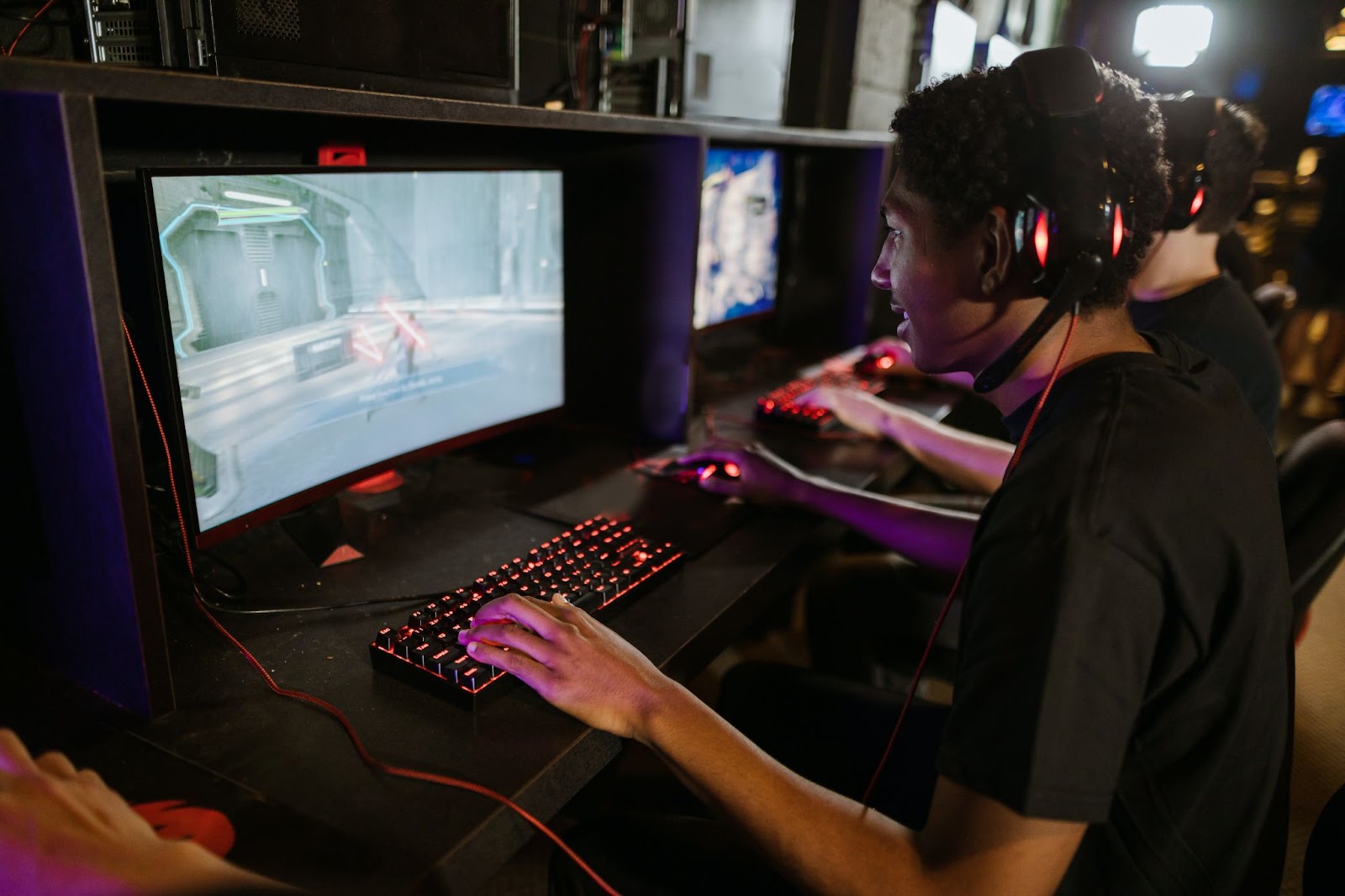
The Olympics and esports have generally been two separate entities, but in recent years there has been an increased focus on connecting them. While at first glance it may be difficult to imagine the Olympics having an esports element, the two can in fact be very closely linked.
In this article, we’ll explore what the current connection between the Olympics and esports is and how it might impact the Olympic games.
Does Olympics Have Esports
The Olympic Games, commonly known as the Olympics, are a major international event featuring competitions in a variety of disciplines among athletes from all over the world. The multi-sport event occurs every two years on alternating Summer and Winter Games circuit. The word “Olympic” comes from Ancient Greece, where the original Olympic Games were held at Olympia over 2000 years ago. Today, the Olympics have grown to include athletes from more than 200 nations and is broadcast to billions of viewers worldwide. At its core, the Olympic Games are meant to celebrate humanity’s highest ideals – friendship, excellence, and sportsmanship – which have been nurtured over time through competition and collaboration between nations. Every participating nation is invited to raise their respective national flags during their country’s opening ceremony in one of sport’s grandest traditions. Medals ceremonies pay homage to each country’s achievements as representatives of their respective nations stand together on podiums for a collective celebration by all participants in an effort to bring prestige to an athlete’s achievement.
A cornerstone of competition during traditional Olympics is the utilization of short-term goals to strive for long term progress; inspiring future generations and cultivating an atmosphere of respect amongst all athletes regardless of nationality or skill level.
Definition of Esports
Esports, also known as electronic sports, is a form of sport competition that is facilitated by electronic systems, such as video games; the input of players and teams as well as the output of the eSports system are mediated by human-computer interfaces. Esports often takes the form of organized tournaments or competitions between professional teams, either in person or online. The most popular esports games usually follow a tournament format in which teams or players compete against each other for a prize; the games most commonly associated with esports are those which have been designed to be played competitively (i.e., they have specific objectives which must be achieved). The growing popularity of esports has led to a variety of events such as major league gaming tournaments and college-level competitions being hosted around the world. In addition, with the rise of smartphones and tablets, there are also mobile gaming tournaments where players can participate without leaving their homes. Most recently, massive international corporations like Intel and Coca Cola have made sizable investments into esports building their brand recognition in this industry. With these investments coming from larger companies, it’s no surprise that Olympic committee officials are taking an interest in making esports part of future Olympic Games events.

History of Olympics And Esports
In recent years, efforts have been made to incorporate esports into the Olympic Games. Thus, one needs to look back on the history of the Olympic Games and the history of esports to understand the connection between the two. This article aims to examine the relationship between the two industries and to discuss why esports may or may not make it into the Olympics.
History of Olympics
The Ancient Olympic Games were held in Olympia, Greece and were dedicated to the Olympian gods. At the time, the games were a festival of sport and culture where athletes from various Greek city-states could come together in a spirit of competition. The events included footraces, chariot races, discus throwing, javelin throwing and wrestling. They extended to three days and eventually grew over time to five days. The first modern Olympics took place in Athens in 1896.
Over the years, Olympic events have evolved from those ancient origins to include popular sports like gymnastics and swimming as well as new disciplines such as beach volleyball and BMX biking. A total of 41 sports are divided into 34 disciplines for the Summer Olympics. For Winter Games sports, there are only 15 sports in seven disciplines. Throughout its history, the goal of the Olympic movement has been to promote environmentalism along with athleticism through international unity within athletic competition—and this is also true for esports; however, there is debate about whether esports should be classified as an official Olympic sport or not due to its digital origin and lack of physical exertion by competitors. Nevertheless we may see a form of Esports at future Olympics one day thanks to recent advances in technology that are bringing esports closer to traditional sports while preserving what makes them unique — namely their ability to bring people together digitally!
History of Esports
Esports, also known as electronic sports or professional gaming, is the term used to describe organized video game competitions that have become increasingly popular in the past decade. It is a form of competition in which players face off against their opponents to prove themselves superior – but instead of sports arenas and physical fields, they take each other on in cyberspace.
Esports began as early as 1972 when Stanford University held an inter-collegiate ‘Spacewar’ tournament. But it wasn’t until much later that it became a widespread phenomenon. During the late 90s and early 2000s, esports began to gain traction with various tournaments springing up, offering prize money for popular games such as Quake and Counter-Strike. By 2012, some of the esports tournaments held had prize pools amounting to millions of dollars, giving rise to professional gamers who receive salaries and generate income through sponsorships and endorsements. Nowadays, there are two major organizations that are responsible for global esports competitions – The International Esports Federation (IESF) and The Electronic Sports League (ESL). The IESF comprises 80 member nations spread across five continents while ESL hosts more than 1 million gamers in its leagues worldwide. As esports continue to grow in popularity globally, there have been talks about including it officially into the Olympic Games program – something that would no doubt be groundbreaking for the industry if it were to be unveiled at an upcoming Olympics Games Ceremony.
The Connection Between Olympics And Esports
The Olympics and esports have more in common than you may think. Esports is gaining popularity and is becoming an increasingly popular form of sport globally. This has led to the governing body of the Olympics, the International Olympic Committee (IOC), to take a closer look at the possibility of adding esports as an Olympic sport.
In this article, we explore the connection between the Olympics and esports.
Olympic Games And Esports
The Olympics and esports are two seemingly very different activities, with the former being a traditional sporting event that has been around for centuries and the latter being a relatively newer form of competitive gaming. Despite their differences, these two unique events have recently come together in remarkable ways. The discussion of whether or not esports should be an Olympic sport has become increasingly popular, with both pros and cons to adding this activity to the world’s biggest sports meet. On one hand, incorporating esports into the Olympics could provide a platform for gamers from all over the world to engage in international competition on an unprecedented scale – facilitating cultural exchange through gaming and allowing talented players to demonstrate their skills on a global stage. On the other hand, there are concerns over how such an integration would change the foundation upon which Olympic excellence has been traditionally based – questions arise as to whether some genres of games would be considered “sports” at all and if so, how they would fit into existing rules banning non-athletic performances or activities at Olympic events. Regardless of debates surrounding its potential inclusion in future Olympiads, esports continue to rise in popularity worldwide.
Professional tournaments are now creating revenue comparable to traditional sports leagues while allowing gamers from countries both large and small access to unprecedented levels of international competition. With inclusion into the Olympic Games potentially opening up even more opportunities for gamers from diverse backgrounds, it remains an intriguing discussion that will continue to be monitored by sports fans around the world.
Olympic Sponsors And Esports
In recent years, the connection between the Olympics and esports has become increasingly apparent. Many Olympic sponsors, such as Intel and Coca-Cola, have expressed interest in the growth of competitive gaming. These major international companies are leveraging their financial resources to become involved in the esports industry, creating opportunities for gamers around the world. Intel is a longtime sponsor of both the Olympic Games as well as several major esports events such as Intel Extreme Masters (IEM). Their sponsorship has also provided global exposure to various top-level professional gaming competitions and tournaments. In addition, Intel’s commitment has allowed them to create programs that award esports players with scholarships; an example of this is their partnership with Intercontinental University (IU) which provides tuition support for individuals who excel in gaming. Not only does Intel sponsor major international tournaments like IEM but also other organizations such as ESL Gaming League which has teams from all over the world competing in online gaming events. This level of involvement from a large sponsor like Intel demonstrates how much potential backed by big companies there is for esports within the Olympic framework. Coca-Cola, another long standing Olympics partner since 1928, announced in 2017 that it was expanding its lineup of gaming sponsorships by becoming a Global Partner for Riot Games’ flagship franchise League Of Legends (LoL). This new partnership representing Coca-Cola’s official foray into esports could pave the way for further collaborations between world championships related to LoL and Olympic sports if not affiliated directly with them yet. Even more recently, Coca-Cola made its playing field a little bit bigger by partnering up with Blizzard Entertainment and Overwatch League (OWL) Twitch in 2018; sponsoring OWL’s expansion team Houston Outlaws which competes in Overwatch tournaments globally both on console and PC platforms at various LANs throughout the year.

Benefits of Integrating Esports Into The Olympics
In recent years, esports have become a major part of the global gaming landscape and a popular form of entertainment. With the rise in esports popularity, there has been increasing talk about whether or not esports should be included in the Olympics.
This section will explore why it would be beneficial to integrate esports into the Olympics.
Increased Participation
Incorporating esports into the Olympics could result in a dramatic increase in participation from gamers who may not have ever considered competing on the Olympic placing. Many established Olympic events draw their participants primarily from traditional sport countries, while the global nature of esports means that competitors could come from any country. In addition, many professional sports require significant investment and training to join – such as gymnastics, skiing and figure skating. Esports don’t require such intensive time investments, making them accessible to many more people around the world. This increased competition could lead to a rise in interest for esports – making it even more popular and appealing than it is today. Another benefit would be that by incorporating esports into the Olympics, there would be opportunities for gamers to learn about and compete in other Olympics events. Esports athletes have the potential to soon represent their country alongside traditional Olympians in the same Games. As such, they can learn about and experience other professional sports first-hand – furthering their knowledge of different sports disciplines and cultures. This increased understanding could give them better appreciation for countries outside their own as well as an increased global reach for eSports as a whole. This aspect alone has immense potential to bring together Olympic athletes with different cultures around different sports disciplines – forming valuable international relationships that last long beyond any one event or competition day.
Wider Audience
Adding esports as an official event to the Olympic Games could bring a broader audience to follow and enjoy the Olympics. Currently, the target demographic of the Olympics falls between eighteen-to-forty-nine years old, where much of the current Esports scene focuses on younger generations. This provides an opportunity to introduce esports to those outside of its current viewership base and attract a larger audience that may not traditionally watch or participate in other events held by the Olympics. Another benefit of introducing esports into the Olympics would be to use it as an educational tool for learning and growing from existing Esports titles. This can offer insight into game design, research, development, and promotion – components that every game should strive for on a professional level. Furthermore, it offers aspiring professionals with more insight on what goes into designing adequately competitive experiences in modern gaming titles. It also gives any budding Esports league developers a good court from which to learn how successful competitions are put together.
Increased Revenue
The most immediate benefit of integrating esports into the Olympic Games is increased revenue. Esports have grown rapidly in popularity over the last decade, and there are now millions of fans worldwide. ESPN reports that nearly 20% of Millennials were interested in watching esports at the 2016 Olympics, which could potentially drive substantial revenue gains for the Games in ticket sales and broadcast rights.
In addition, with millennials more likely to participate in paid streaming services compared to traditional television broadcasts, integrating esports into the Olympics would provide an influx of revenue from young viewers who would be more willing to purchase digital subscriptions or pay-per-view access. Furthermore, introducing esports to a wider audience through blanket media coverage at the Olympics could introduce potential sponsors to this new sport. Currently, many competing players and teams do not have individualised sponsorships with companies outside of those directly invested in eSports; however, having a larger platform such as the Olympics gives international brands an additional opportunity to get involved with eSports and help create growth opportunities for those already involved in competitive gaming.
Challenges of Integrating Esports Into The Olympics
With esports being rapidly adopted all across the world, there has been a growing interest in seeing it included in the Olympics. However, there are many challenges that need to be addressed if esports were to be added to the Olympic Games. In this article, we will look at the major issues that will need to be resolved before esports can be added to the Olympics.
Lack of Regulation
One of the main challenges of integrating esports into the Olympic Games is the lack of regulation, which creates an environment that is not suitable for a large-scale international event such as the Olympics. Esports, while becoming increasingly popular on both a professional and global scale, lacks a legitimate governing body or global standard. This lack of standardization within this industry makes it difficult to determine which games and rules would most effectively represent the world’s esports playing population. Further complicating matters is that all video games are subject to copyright and ownership rights. As such, it can be complicated for game developers to allow their games to be played in an event as large and far-reaching as the Olympics due to potential legal issues, financial demands, and other concerns that arise from competing against one another in an officially recognized sporting tournament. Finally, due to different standards and formats around both gaming hardware and software used globally, presenting Esports at the Olympics may be cost prohibitive for some countries whose citizens cannot or do not own or have access to specific gaming devices needed for events.
Lack of Standardization
One of the biggest challenges that come with the integration of esports into the Olympic Games is the lack of standardization between different games. Esports encompasses a wide range of video games and genres, each with their own specific rules, objectives, strategies and even control schemes. This can make it difficult for Olympic officials to develop a consistent set of standards when evaluating and judging players from varying disciplines. On top of this, each game has its own unique tournament formats and play styles that need to be taken into account when forming official Olympic competition criteria. Additionally, not all games are viewed as appropriate content for an international sporting event with some having violence or extreme graphics that do not fit in the spirit of the Olympics. In order to address these issues, various organizations have proposed standardized rule sets for esports such as those from the World Esports Association (WESA) which outlines game formats and regulations designed to provide fairness and consistency among participants. Furthermore, a variety of organizations have created event circuits or leagues designed specifically towards preparing teams for potential Olympics inclusion including FACEIT’s ECS Youth Championship which helps identify rising young talent in popular esports titles such as League Of Legends or CS:GO, RV’s ELEAGUE championship series which showcases world class players in titles such as Overwatch or Rocket League and more recently Blizzard’s Overwatch Contenders league which functions as an amateur developmental platform leading up to its professional competition level The Overwatch League.
Esports Culture
Esports have grown swiftly over the past few decades, with competitive gaming becoming a global phenomenon. The esports community and culture is as diverse and varied as its participants, which can present a challenge when attempting to integrate them into an international platform such as the Olympics. The unique language, jargon, customizations and techniques required for success can make it difficult for fans to understand what’s happening in an intense esports match. In addition to potential language barriers, integrating esports into the Olympics must also take into account cultural differences between different gaming communities. For example, professional gamers from Korea have their own way of expressing (and engaging with) competitive games which may not be immediately understood by those outside of that community. There’s also a need to consider the growing range of mobile-focused titles as well as traditional console or desktop games. Finally, due to the widely varying nature of esports games and subgenres, any attempt at integration would require careful thought about which titles should be included in the Olympic Games — both from a cultural perspective (which games are most popular in different parts of the world) and a technical standpoint (are all players on an even playing field?). It might also be hard to agree on appropriate rulesets given that different game genres could feature vastly different objectives or methods of victory.
Conclusion
In conclusion, the evidence indicates that esports are an area of growth for the Olympics and may become an official part of the Games in the future. This is due to a combination of factors including increased viewership for esports, improved technology, and endorsement from public figures like Thomas Bach and Asian countries like Japan and South Korea. However, esports inclusion in future Olympic events is ultimately dependent on the International Olympic Committee’s opinion as well as working towards a consensus from other National Olympic Committees. National governments must also be willing to recognize esports as legitimate sporting entities in order for them to be seriously considered as Olympic events.




